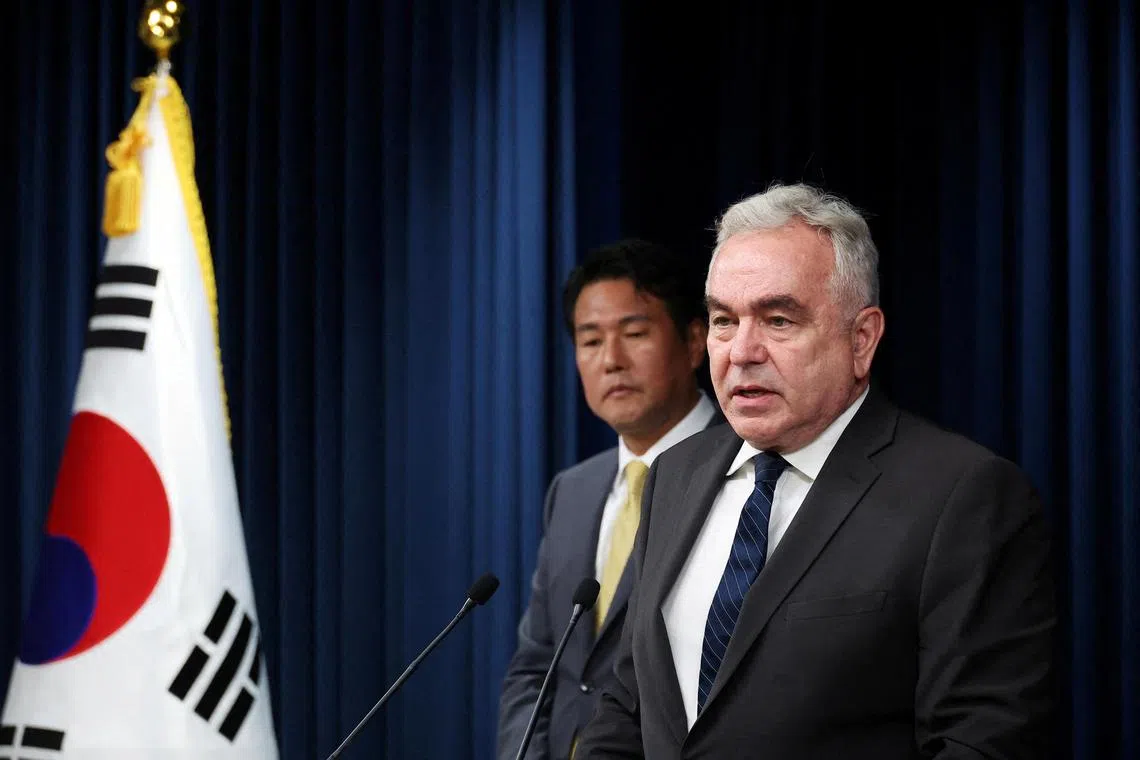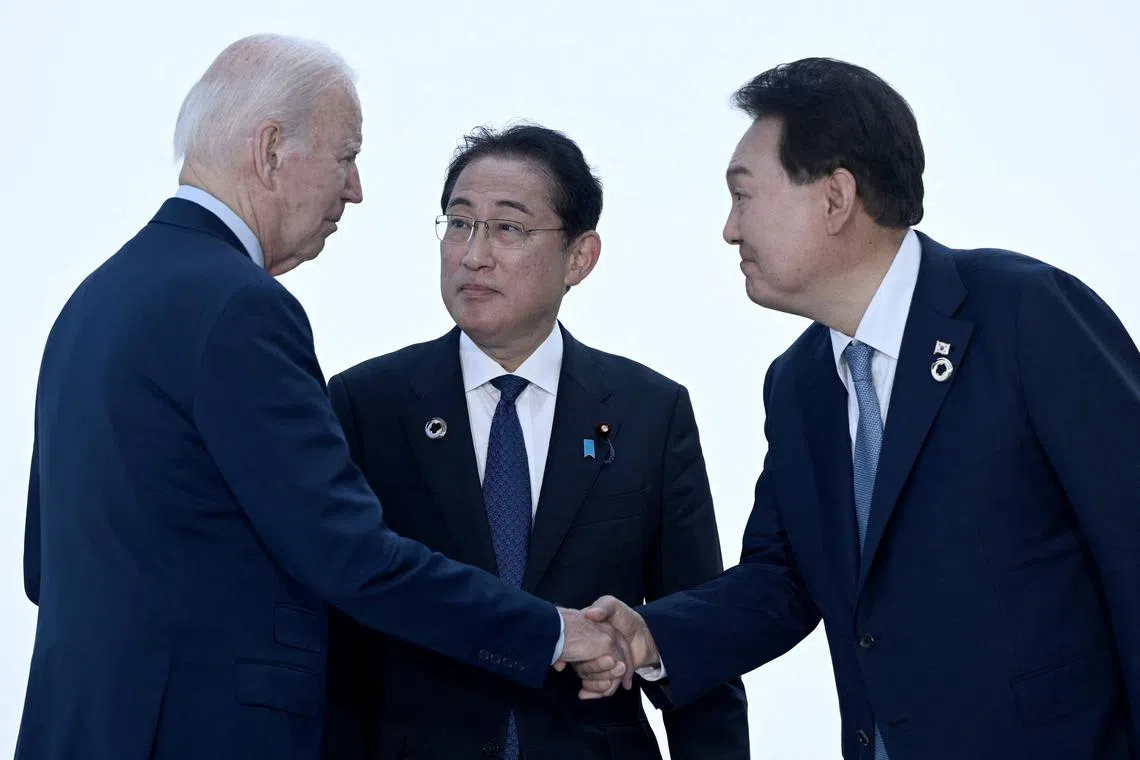US summit with S. Korea, Japan will seek to lock in progress, says US official
Sign up now: Get insights on Asia's fast-moving developments

White House Indo-Pacific coordinator Kurt Campbell (right) says the US' relationship with Japan and South Korea will be a “defining trilateral relationship for the 21st century”.
PHOTO: REUTERS
Follow topic:
WASHINGTON – A US summit with Japan and South Korea on Friday will include an ambitious set of initiatives to lock in progress between the allies, White House Indo-Pacific coordinator Kurt Campbell said on Wednesday.
He said the US relationship with Japan and South Korea would be a “defining trilateral relationship for the 21st century”.
Senior US administration officials have said the summit will launch joint initiatives on technology and defence, amid mounting shared concerns about China and North Korea.
“What you will see on Friday is a very ambitious set of initiatives that seek to lock in trilateral engagement, both now and in the future,” Mr Campbell told a Brookings Institution event.
The summit at the Maryland presidential retreat of Camp David will be the first stand-alone meeting between the United States and its two allies.
Mr Campbell said there were plans to make it an annual event and to invest in technology for a three-way crisis hotline.
US President Joe Biden invited Japanese Prime Minister Fumio Kishida and South Korean President Yoon Suk-yeol to Camp David as the Asian nations try to mend their tattered diplomatic ties in the face of rising regional threats.
Washington has formal collective defence arrangements in place with Tokyo and Seoul separately, but wants them to work closer together, given growing concerns about China’s mounting power and intentions.
US officials said there will be no formal three-way security framework, and Mr Campbell acknowledged domestic political constraints in the countries. He said agreements reached at the summit would be “a substantial step forward in recognising the common security picture that each of the countries are facing” and recognising that “it will require common actions”.
“I think we can imagine a future with more ambition, but... the key is not to get too far over your skis, to take this a step at a time to build appropriately to not get beyond the domestic context of which we’re dealing.”

US President Joe Biden has invited Japanese Prime Minister Fumio Kishida (centre) and South Korean President Yoon Suk-yeol (right) to Camp David in the United States.
PHOTO: AFP
Mr Campbell said the three would explore how to extend their security cooperation but do so prudently, carefully and responsibly.
He praised the courage of Mr Yoon and Mr Kishida in mending ties fraught with historical baggage, stemming particularly from Japan’s past colonial rule of Korea, calling it “a breathtaking kind of diplomacy”.
“It belongs on the top tier with respect to diplomatic initiatives of modern times,” he said.
Mr Campbell said the aim of the summit was to “try to embed this in our politics in such a way that it will be hard for any leader in (any) of the three countries” to back out.
His comment alluded both to the perceived fragility of the Seoul-Tokyo rapprochement and to concerns about the stance of a future US government after former US president Donald Trump voiced scepticism about whether Washington benefits from its traditional alliances.
North Korea may launch an intercontinental ballistic missile or take other military action to protest against the summit, a South Korean lawmaker said on Thursday, citing the country’s intelligence agency.
The North has criticised the three countries’ deepening military cooperation as part of a dangerous prelude to the creation of an “Asian version of Nato”.
The reclusive state could also attempt another spy satellite launch in August or early September after its first effort failed in May, Mr Yoo Sang-bum, a member of the South Korean Parliament, told reporters.
Speaking after a meeting with the chief of the National Intelligence Service, he said there was a chance the North would launch the satellite to celebrate its founding anniversary on Sept 9.
North Korean leader Kim Jong Un has set a priority of conducting a launch in the second half of 2023, said Mr Yoo.
North Korea and Russia agreed on broad defence cooperation when Russia’s defence minister met Mr Kim in July and watched a military parade with him in the capital Pyongyang, Mr Yoo quoted South Korean intelligence as saying.
“The National Intelligence Service is anticipating that Russia and North Korea will speed up their defence cooperation and is closely tracing movements” to spot any possible Russian transfer of nuclear missile technology to the North, he added.
Russian officials appear to have visited North Korea earlier in August to discuss details of military cooperation and South Korea spotted signs of military supplies being shipped out of Pyongyang on a Russian plane on Aug 8, he said.
Washington has criticised North Korea for providing weapons to Russia for its war in Ukraine, which Russia calls a “special operation”.
On Wednesday, the United States imposed sanctions on three entities it accused of being tied to arms deals between the two countries.
Pyongyang and Moscow have denied having arms transactions. REUTERS

